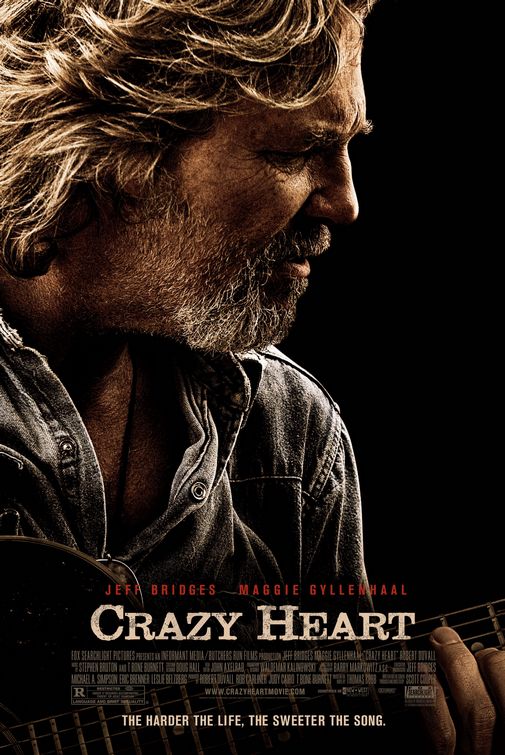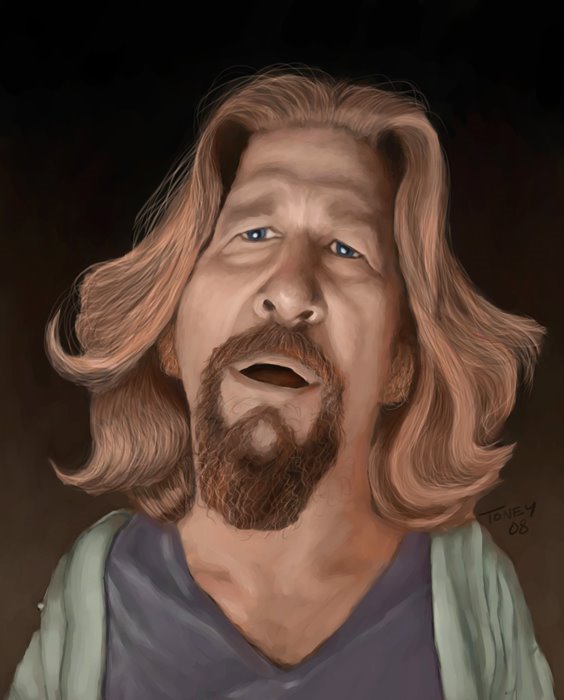
Best director nominees included James Cameron for “Avatar” and Kathryn Bigelow for “The Hurt Locker”; best actor nominees included George Clooney (“Up in the Air”) and Jeff Bridges (“Crazy Heart”); and best actress nominees included Sandra Bullock (“The Blind Side”) and Meryl Streep (“Julie & Julia”).
The singer, songwriter and producer T-Bone Burnett says his approach to making music is simple: “Just listen until it sounds right.” Burnett has been getting it right for a long time, and his latest project is the critically acclaimed film Crazy Heart, for which he wrote several songs for the main character — a broken-down musician played by Jeff Bridges. The film offered Burnett the chance to take audiences back to his Texas roots with a varied score. (Burnett’s collaborator was the late guitar-player and songwriter Stephen Bruton.) The movie recently picked up two Golden Globe nominations — one for Bridge’s performance and a second for Burnett’s hit theme song “The Weary Kind.” The accolade comes as just the latest in Burnett’s storied career. He’s toured with Bob Dylan and worked as a producer for renowned artists like Elvis Costello and B.B. King; he was founder of the indie label DMZ, and as a songwriter he’s earned several Oscar nominations. Fresh Air talks to Burnett about music, about Crazy Heart and about collaborating with Stephen Bruton.
CINEMA: The Dude Elides*

[Illustration by DAN JOHNSON]
CRAZY HEART (2009, directed by Scott Cooper, 111 minutes, U.S.)
BY DAN BUSKIRK FILM CRITIC A great country song finds strength in simplicity, you can guess the lyric’s rhymes and sing along with the melody on the very first time you hear it. Crazy Heart, a new character study showcasing Jeff Bridges as an aging musician, is true to the form: it is weary-hearted tale that rolls out plot twists that you can spot from two verses away. Bridges brings his laconic wit to the character of Bad Blake, a once-popular country performer and songwriter (somewhere between honky tonker Merle Haggard and Texas cult country writer Townes Van Zandt) who we meet as he appears to be on a tour of Midwestern bowling alley lounges. Any blows to his dignity are cushioned by free-flowing whiskey and middle-aged groupies but he’s encouraged to clean up his act once he falls for a pretty journalist named Jean (Maggie Gyllenhaal) and her fatherless four year-old son.
 At its best Crazy Heart’s wide-open spaces make Blake seem like a lonely last cowboy, drifting aimlessly without his herd and singing for the few people who still care. Writer/director Scott Cooper wrote the script with Jeff Bridges in mind, realizing it was well within Bridges’ gifts to bring the fading country singer Bad Blake to life. And sure enough, the role of the worn-and-frayed honkytonker fits Bridges like a glove, but that ultimately works against the film. In this, a summation of many roles Bridges has played before (including, yes, The Big Lebowski’s “The Dude”), he’s so comfortable in the role that he could be accused of sleepwalking through his performance. His villainous role in Iron Man drew less attention but is a better example of Bridges’ ability to find untapped nuances in his work. Bad Blake is a simple guy at heart, he just wants to drink and play his music and making him go sober doesn’t really supply much fun or revelation. Oddly, it seems like Cooper is hyper-conscious about showing Blake doing anything truly unlikable, as if he’s unwilling to test his star’s deep reserve of affability.
At its best Crazy Heart’s wide-open spaces make Blake seem like a lonely last cowboy, drifting aimlessly without his herd and singing for the few people who still care. Writer/director Scott Cooper wrote the script with Jeff Bridges in mind, realizing it was well within Bridges’ gifts to bring the fading country singer Bad Blake to life. And sure enough, the role of the worn-and-frayed honkytonker fits Bridges like a glove, but that ultimately works against the film. In this, a summation of many roles Bridges has played before (including, yes, The Big Lebowski’s “The Dude”), he’s so comfortable in the role that he could be accused of sleepwalking through his performance. His villainous role in Iron Man drew less attention but is a better example of Bridges’ ability to find untapped nuances in his work. Bad Blake is a simple guy at heart, he just wants to drink and play his music and making him go sober doesn’t really supply much fun or revelation. Oddly, it seems like Cooper is hyper-conscious about showing Blake doing anything truly unlikable, as if he’s unwilling to test his star’s deep reserve of affability.
Bridges is never less than watchable as always, Crazy Heart’s problems can be blamed on Cooper’s under-written script and its dramatic timidity. Even when Blake hits bottom, its a pretty shallow crevice, nothing that a scene in rehab can’t correct. Sort of The Wrestler-lite, Crazy Heart has an eye for the dingy indignities of the road: the beat-up motel rooms, the way Blake uses his hand to guide the window of his Chevy Silverado as he rolls it up and pees in a milk jug to save time on pit stops. But clever details don’t make a movie, and Crazy Heart is to afraid to jolt the story from its air of cozy sentimental reverie into something darker, richer and ultimately, truer.
*e?lide
–verb (used with object), e?lid?ed, e?lid?ing.
| 1. | to omit (a vowel, consonant, or syllable) in pronunciation. |
| 2. | to suppress; omit; ignore; pass over. |
CINEMA: Dark Ride Of The Moon
![]() AVATAR (2009, directed by James Cameron, 162 minutes, U.S.)
AVATAR (2009, directed by James Cameron, 162 minutes, U.S.)
BY DAN BUSKIRK FILM CRITIC
Avatar has been unleashed! Aided by ever-faster microchip technology James Cameron has given us a future world we’ve never seen with such clarity. With his audience goggled up for 3-D like motocross racers, Cameron’s long-gestating sci-fi fantasy zooms you through foreign jungles with hitherto unseen big-screen spectacle. For people looking to sit in a theme park ride two hours and forty-some minutes, your moment has arrived. People love roller coasters, I love roller coasters, but I don’t receive the emotional jolt from those four-story drops that I receive from my favorite films. Avatar might be an experience you don’t want to miss, but I can help but mourn what it could’ve have been had it contained the richness of a great film as well. Cameron’s loopy vision has revealed Avatar to be both his theatrical highpoint and his worst-directed film to date.
Like a video game, Cameron hangs this massive production on the barest bones of a tale, and it is the oft-told soldier “gone native” story that is part of the narratives of Apocalypse Now, Little Big Man, The Last Samurai, Dances with Wolves, etc. Given a sci-fi twist, the soldier Jake (last summer’s Terminator, Sam Worthington) is transferred into the body of a ten-foot blue alien from the Na’vi tribe, who live on the prehistoric jungle planet of Pandora. The U.S. is coveting a rare mineral of the planet (called “Unobtainium”, yuk yuk) and they’re hoping that Jake can broker a deal to move the Na’vi off their sacred land so U.S. interests can get to strip-mining.
What a surprise, Jake enjoys being a ten foot tree-hugger in the Eden of Pandora more than being a handicapped vet on his withering home planet! What a shock when Jake and the svelte, model-hot Neytiri (Zoe Saldana) go from arguing to loving! Typical of these imperial fantasies, within a few weeks of being brought into the tribe Jake has won the princess’ heart, mastered the rituals of their culture, become their leader and even rides their “un-rideable” giant orange bat. Is there anything a disciplined Marine can’t do? The plot is terribly familiar, despite all the characters glowing like exotic deep sea fish, and at two and a half hours Avatar drags its tail in propelling the story to where we knew we were going all along.
Twelve years is a long time between films and like George Lucas when he![]() re-emerged to direct the Star Wars sequels, Cameron has developed some real rust on him, especially as a screenwriter. When you’re the CEO of a quarter billion dollar venture like this there must be plenty of “yes men” around; this might explain why Cameron-penned tough guy insults like “num-nuts” and ”pukes” survived re-writes. If two and a half hours is the length Cameron prefers for his films, he needs to write better-defined characters then the interchangeable cast he’s assembled here. And give them something more to do than root earnestly for our Jake. I’m guessing that if someone on the set suggested that the villains (evil businessman Giovanni Ribisi and evil-er general Stephen Lang) needed more depth, Cameron rushed to the camera to re-adjust the 3-D lenses.
re-emerged to direct the Star Wars sequels, Cameron has developed some real rust on him, especially as a screenwriter. When you’re the CEO of a quarter billion dollar venture like this there must be plenty of “yes men” around; this might explain why Cameron-penned tough guy insults like “num-nuts” and ”pukes” survived re-writes. If two and a half hours is the length Cameron prefers for his films, he needs to write better-defined characters then the interchangeable cast he’s assembled here. And give them something more to do than root earnestly for our Jake. I’m guessing that if someone on the set suggested that the villains (evil businessman Giovanni Ribisi and evil-er general Stephen Lang) needed more depth, Cameron rushed to the camera to re-adjust the 3-D lenses.
Once you become accustomed to Avatar’s undeniable scope, its lack of cleverness is laid bare. Cameron has never seemed so eager to pull out his old tricks, whether it is the never-ceasing “My Heart Will Go On” soundalike score, or Sigourney Weaver’s Ripley-esque scientist or another fight with one of the robot-suit loaders from Aliens. Avatar carries a preponderance of old baggage for being the Next Big Thing.
It’s a shame because there is real beauty that emerges out of the bombast from time to time, with the over-sized neon fauna and the film’s radiant purples and greens. At every turn though, Cameron’s insecurity as a storyteller and as a showman lets him down. Wanting to increase a scene’s drama used to call on a director’s invention, now it seems like it is too easy just to pump up the drama by cutting and pasting a few dozen more of the CGI threat onto the screen. Further undercutting the drama is Cameron’s love of the visceral, which leads him to linger too long behind Jake as he jumps, swings and flips across our view, as if he is powered by an unseen joystick. One half-expects to see points accruing in the upper right-hand corner. All this shock and awe doesn’t disguise the paradox at Avatar’s heart: its a film that propagandizes embracing nature, made in a medium that makes the spontaneous gesture impossible. Maker of air-tight fantasy recommends crowd in 3-D glasses gets back to nature; Doctor Cameron, don’t discount healing yourself.
